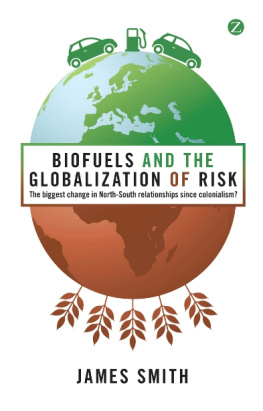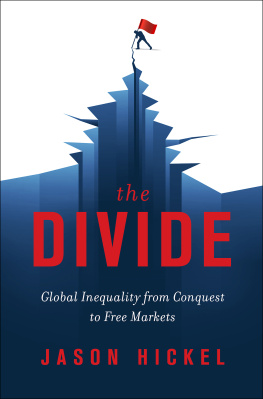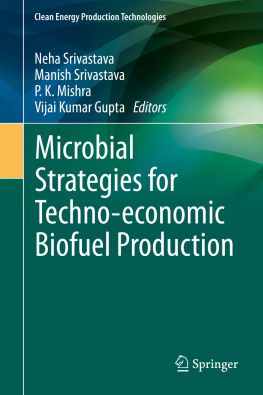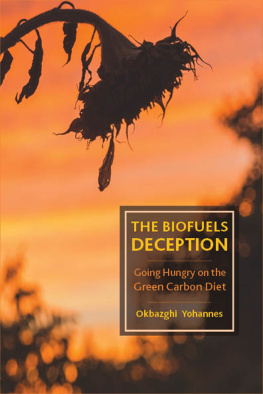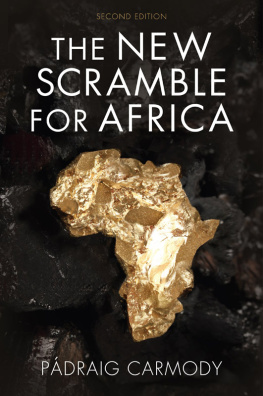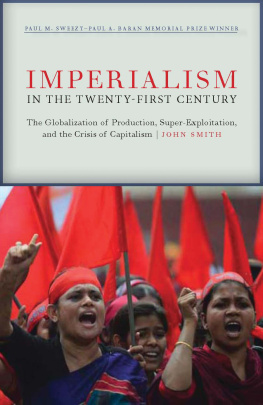About the authors
James Smith is professor of African and development studies in the Centre of African Studies. He is also a director at the ESRC Innogen Research Centre at Edinburgh and a visiting fellow in development policy and practice at the Open University. His research explores the relationships between knowledge, science and development, particularly in relation to agricultural research and how it is practised. He has worked with many international organizations and research centres, including Oxfam, DfID, IDRC and the Consultative Group on International Agricultural Research.

Biofuels and the globalization of risk: the biggest change in NorthSouth relationships since colonialism? was first published in 2010 by Zed Books Ltd, 7 Cynthia Street, London N1 9 JF , UK and Room 400, 175 Fifth Avenue, New York, NY 10010, USA
www.zedbooks.co.uk
Copyright James Smith 2010
The right of James Smith to be identified as the author of this work has been asserted by him in accordance with the Copyright, Designs and Patents Act, 1988
Set in Monotype Sabon and Gill Sans Heavy by Ewan Smith, London
Index: ed.emery@thefreeuniversity.net
Cover designed by Rogue Four Design
Distributed in the USA exclusively by Palgrave Macmillan, a division of St Martins Press, LLC , 175 Fifth Avenue, New York, NY 10010, USA
All rights reserved. No part of this publication may be reproduced, stored in a retrieval system or transmitted in any form or by any means, electronic, mechanical, photocopying or otherwise, without the prior permission of Zed Books Ltd.
A catalogue record for this book is available from the British Library
Library of Congress Cataloging in Publication Data available
eISBN 9781780320229
Acknowledgements
The research and the time necessary to write this book have been primarily supported by two grants. I would like to acknowledge the UK Economic and Social Research Council and their grant to the ESRC Innogen Centre. I would also like to acknowledge the UK Department for International Development for funding our five-year PISCES project (Policy Innovation Systems for Clean Energy Sustainability), which has given me the opportunity to meet many new colleagues from many parts of the world. Thanks to my colleagues at the African Centre of Technology Studies, Kenya, the University of Dar es Salaam, Tanzania, the M. S. Swaminathan Research Foundation, India, and Practical Action Consulting, UK and Sri Lanka. All opinions and errors are, of course, mine.
I would like to thank several of my colleagues for wisdom and assistance: Norman Clark, Lawrence Dritsas, Steven Hunt, Tom Molony, Arivudai Nambi, Colin Pritchard and Judi Wakhungu. In particular I would like to thank some of my (current and ex-) doctoral students who have helped in many ways, in particular Maija Hirvonen, Shishusri Pradhan and Shaun Ruysenaar.
Finally, I would like to dedicate this book to my partner, Barbara, whose interest in liquid biofuels extends about as far as a good South African Merlot, but whose interest in social justice, international development and Africa extends to all horizons.
Acronyms
| CGIAR | Consultative Group on International Agricultural Research |
| CIAT | International Center for Tropical Agriculture |
| CIFOR | Center for International Forestry Research |
| CIMMYT | International Maize and Wheat Improvement Center |
| ECOWAS | Economic Community of West African States |
| EPA | Environmental Protection Agency |
| EROI | energy return on investment |
| EU | European Union |
| FAO | Food and Agriculture Organization |
| FDI | foreign direct investment |
| GHG | greenhouse gas |
| GM | genetically modified |
| ICRISAT | International Crops Research Institute for the Semi-Arid Tropics |
| LCA | life-cycle analysis |
| NGO | non-governmental organization |
| OECD | Organisation for Economic Co-operation and Development |
| R&D | research and development |
| RTFO | Renewable Transport Fuel Obligations |
| UK | United Kingdom |
| UN | United Nations |
| UNCTAD | United Nations Conference on Trade and Development |
| UNDP | United Nations Development Programme |
| UNEP | United Nations Environment Programme |
| USA | United States of America |
| WTO | World Trade Organization |
ONE
Introduction: perfect storms
In 2009, John Beddington, the UK Government Chief Scientific Adviser, adopted the term perfect storm to describe a future global confluence of food, water and energy insecurity (2009). While Beddington captured something of the unprecedented nature and threat of the future, the choice of storm as a sort of metaphorical de-anthropomorphism ran somewhat counter to the usual humanizing of extreme weather events; for we need to be absolutely clear that the processes and interactions that will lead to food, water and energy insecurity are primarily driven by us, our exigencies and the choices we make. A great many of these interactions hinge on our trajectories of development and wielding of new knowledge and new technologies.
It is becoming increasingly apparent, and increasingly globally apparent, that we must learn how to better harness science and technology to these ends, and accordingly we need to understand the complex, interrelated contexts and processes that lead to new technologies, new priorities and new directions that will serve our future and deal with, rather than exacerbate, present and future risks. Biofuels liquid fuels that are directly derived from renewable biological resources and especially from purpose-grown crops throw many of these issues into the sharpest relief. One of the most striking features of biofuels as a global solution is their huge potential to entirely reshape livelihoods, patterns of resource consumption, environments and agro-food production systems; there is a cost for every benefit, and that is often invisible under the veneer of technological promise.
Much as the technological optimism of biofuels shifts responsibility towards the immediate futures of others, biofuels risk exporting impact and risk elsewhere. The production of biofuels risks reprioritizing land use across the globe, and as yet we know relatively little about the implications of this. Biofuels are driving, and transforming, the increasingly entangled relationship between energy, food security and climate change, and consequently trying to understand the politics, narratives and discourses that drive policy and practice surrounding biofuels provides an opportunity to reflect on the thorny relationship between science, development and the environment ().
In some respects biofuels are simple technologies. We are simply deriving energy from plants, through seed oil or biomass, primarily to combust in car engines. Future, better technologies may unlock efficiencies or new ways of deriving energy from plants, but the basic principle remains. In other respects biofuels are extremely complex. They are being developed within complex systems and their production in itself creates new complex systems. They generate couplings between agricultural systems, international markets, petrochemical companies, consumers and producers. These couplings have implications of their own. Charles Perrow, in his book Normal Accidents (1999), analyses the implications of the unexpected consequences of technological interactions taking place within what he terms tightly coupled systems. These systems are so interrelated and complex that there is no easy way to control or contain negative consequences once a technology has started to unravel. This unravelling may quickly become irretrievable, and indeed any attempts to intervene may exacerbate the problem if we simply do not sufficiently understand the mechanics or truly recognize the root of the problem. The lure of biofuels may blind us to the risks bound up in the intricacies of new technologies and the limits of our ability to deal with them. We may understand the chemistry of photosynthesis and the physics of combustion, but we may not understand the gamut of interactions and implications necessary to efficiently join them up.

